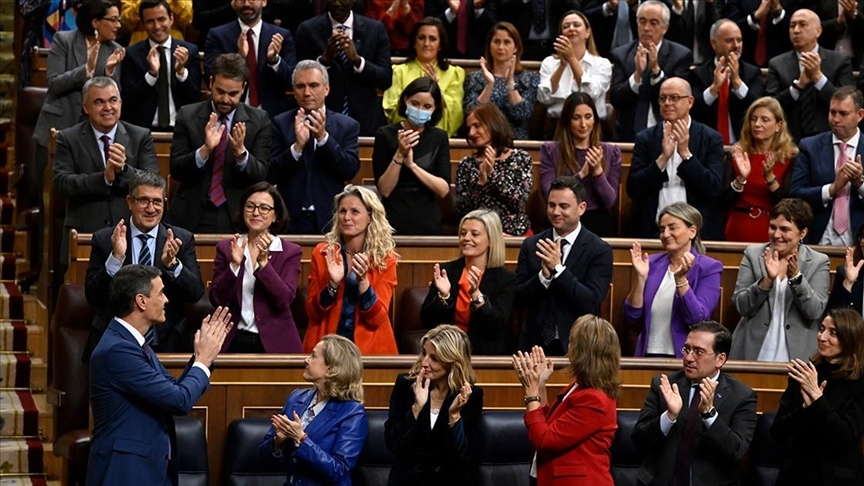
OVIEDO, Spain
After Socialist Party leader Pedro Sanchez was reelected last week to lead Spain, he unveiled the new Cabinet for his progressive coalition government on Monday.
“It’s a team that combines renewal with permanence; experience with youth. A government of women and men who will provide stability to the country over the next four years; a team with high political profiles for a term of high political profile,” Sanchez said in a speech.
Many ministers with the most senior portfolios will hold onto their posts. This includes the deputy prime ministers — Nadia Calvino as economy minister, Yolanda Diaz as labor minister, Teresa Ribera as environment minister, and Maria Jesus Montero, who holds onto her post as treasury minister but has ascended to fourth deputy prime minister.
Felix Bolanos, widely considered Sanchez’s right-hand man, has also risen in importance — now the minister of justice and the president's office. The ministers of interior, defense, foreign affairs, and agriculture remain the same.
One of the major differences with the past administration is the removal of politicians representing the Podemos party. In July’s election, Spain’s far-left candidates ran under the umbrella party of Sumar, but members of the radical anti-austerity party have lost their ministerial posts.
“This is a serious mistake and very bad news for Spain because it limits the possibility of deeply transforming the country,” Podemos spokesperson Pablo Fernandez told media.
Irene Montero of Podemos, the minister of equality behind the controversial “yes means yes” bill, is being substituted for Ana Redondo of the Socialist Party. Ione Belarra, Podemos secretary general and former minister of social rights, known lately for her calls to cut diplomatic ties with Israel, is being substituted by Pablo Bustinduy of Sumar.
Bustinduy appears to hold similar views on Palestine as Belarra, recently calling Israel’s actions in Palestine “barbaric” and saying that “1 million children living in hell … is unacceptable,” referring to the current situation in Gaza due to Israeli attacks.
Last week, Sanchez said one of his main priorities for the new term is recognizing the State of Palestine.
Members of the far-left Sumar party will hold five ministerial posts — labor, culture, social rights, youth, and health. Many in the healthcare community celebrated the appointment of Monica Garcia, a doctor, as health minister, applauding that a health minister finally comes from the medical profession.
In total, 12 of the 22 ministers are women. This is the second-largest Cabinet in Spain’s modern democratic history.
“To sum it up, this government will be markedly feminist … it will also continue the same policies as before in the areas of the economy, prioritizing social policies, and more specifically housing and policies for young people,” said Sanchez.
The premier emphasized the creation of new ministries — housing and urban agenda, digital transformation, and youth and childhood.
The Popular Party slammed the new Cabinet, according to Spanish daily El Pais, saying that it will be “the most expensive government in history.”
Meanwhile, the Popular Party, Podemos and the leading police union all criticized the reappointment of Fernando Grande-Marlaska as interior minister.
El Pais reported that Spain’s conservatives expected him to be ousted after “the Pegasus spyware scandal, his lies about what happened around the incident where many died on the Melilla border fence, and the migration crisis.”
Anadolu Agency website contains only a portion of the news stories offered to subscribers in the AA News Broadcasting System (HAS), and in summarized form. Please contact us for subscription options.







